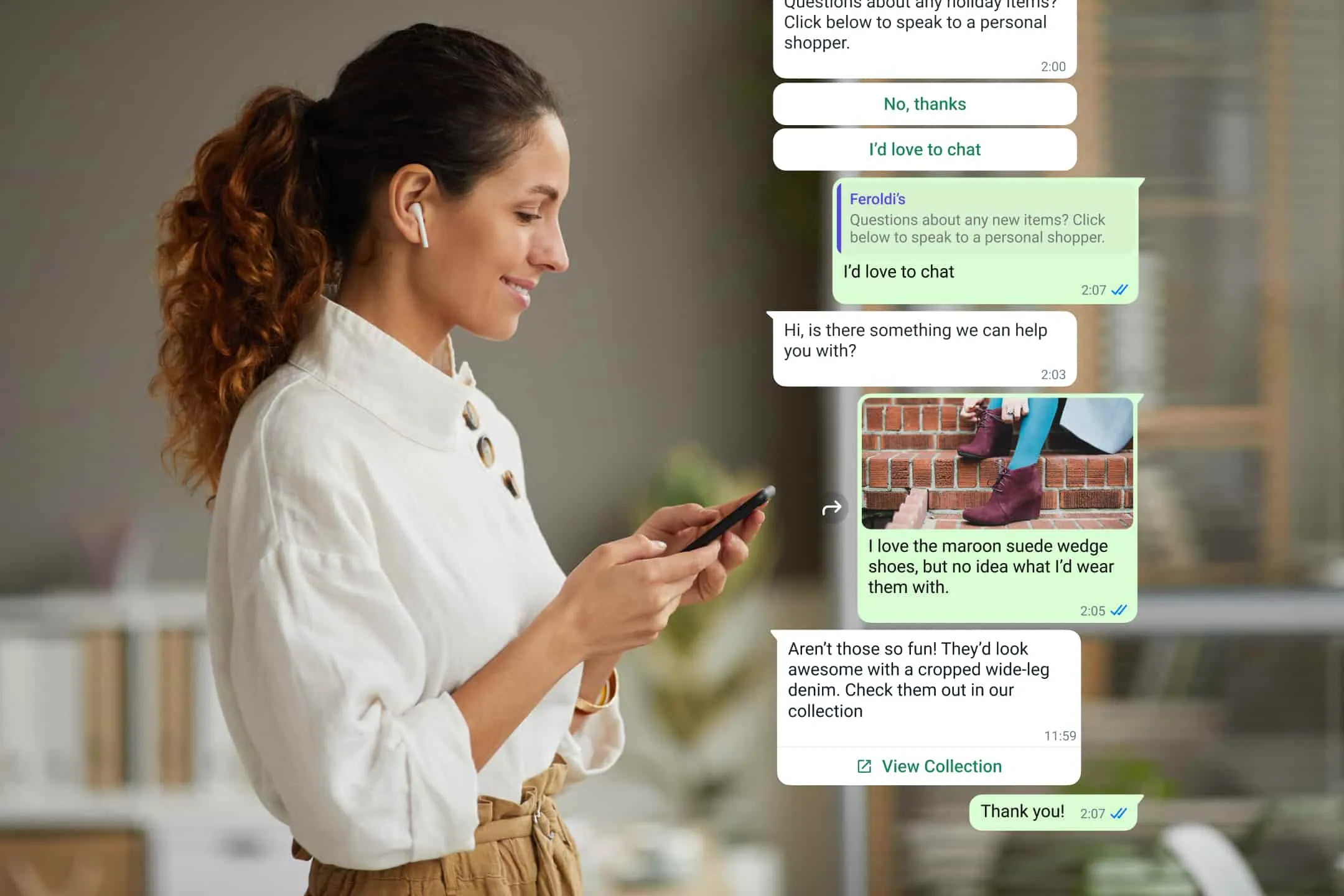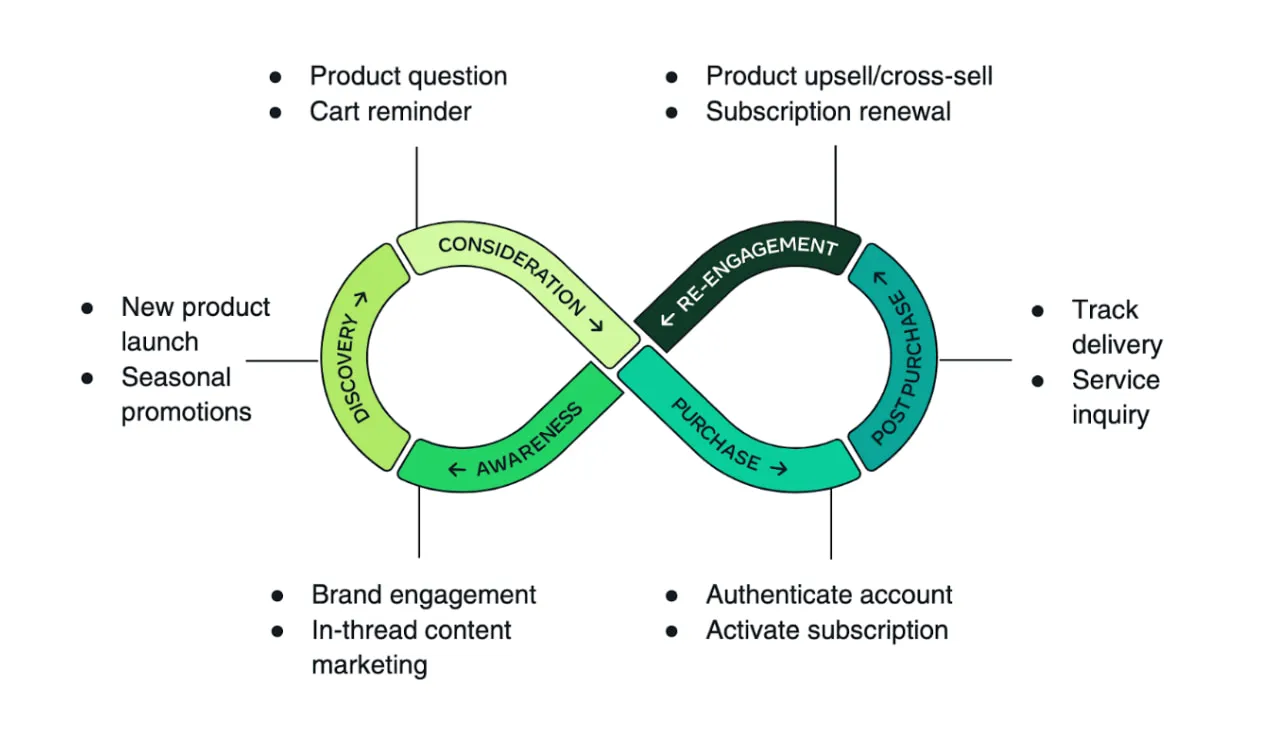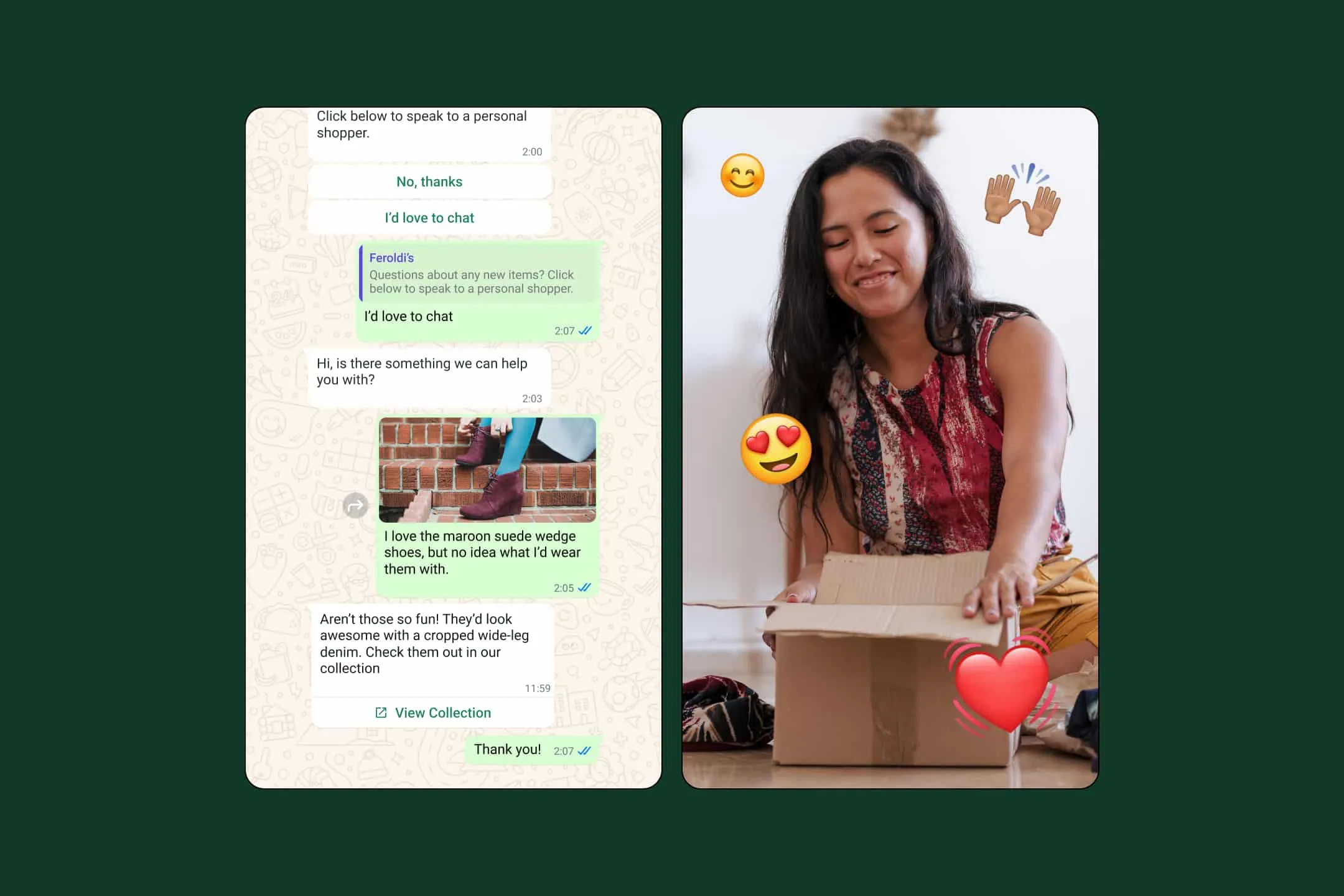Customers
Customer Engagement: The Ultimate Guide to Engagement Strategies
|
September 10, 2025
Customers
|
September 10, 2025

Customer experiences are at the heart of any business, helping shape customer engagement outcomes like turning potential customers into brand loyalists. Companies that put customer experience at the center achieve twice the revenue growth of those that fall behind in this area, according to research from McKinsey & Company. However, audiences can often receive one-size-fits-all messages that ignore their preferences, purchase history and individual journey with a business. This disconnect can lead to customers seeking out brands that better understand their needs.
So, how do businesses cut through the noise and create meaningful connections? The answer lies in strategic customer engagement strategies that turn transactional exchanges into ongoing relationships built on relevance, value and genuine understanding.
Customer engagement is the ongoing process of customers interacting and building meaningful relationships with businesses that extend beyond a single purchase. Businesses can create connected experiences that provide value at every touchpoint, fostering deeper loyalty from their customer base and better word of mouth about the brand.
Effective customer engagement demands cross-functional collaboration across teams, from marketing and sales to customer service and product development, all working together to create cohesive, personalized experiences throughout the customer lifecycle.
The most effective engagement strategies recognize that success depends on being present at the right place, at the right moment within the customer lifecycle. Businesses who stay informed about their customers’ evolving needs can help them progress from initial awareness to purchase and re-engagement:

Customers today expect a deeper level of engagement with brands, and often reward businesses that deliver. In fact, benchmark data from Zendesk reports that 3 in 4 consumers will spend more with businesses that provide a good customer experience.
Businesses aren't just competing against their competitors' products, but against the positive experiences a customer has had with engaging with other brands.
Beyond driving loyalty, effective engagement campaigns enable businesses to get insights on customer preferences, pain points and evolving needs through direct interactions. This data helps give businesses an advantage: insight on how to best communicate with their customer base.

Personalized communication is about tailoring messages, offers and interactions to individual customers based on their specific preferences, behaviors and needs. In fact, 70% of online adults find messaging more personal than other forms of communication.1 By incorporating personalized messaging into your engagement strategy, businesses can better understand customers well enough to create relevant experiences that feel custom-made for each person.
For instance, a personalized communication strategy helped Dermalogica extend one-to-one skincare consultations beyond retail locations. The company worked with a Meta Business Partner to deliver personalized advice to customers through a versatile messaging channel using the WhatsApp Business Platform. Interested shoppers could engage with trained consultants through text or voice messages, request skincare consultations, and receive tailored product recommendations—all in real time. This approach resulted in 1.7X more revenue per recipient, 1.9X higher open rates, and 5X higher click-through rates compared to email.
Need help implementing our messaging solution for your business?
Find a Meta Business Messaging Partnerto plan, build, and integrate WhatsApp as a powerful channel to connect with your customers.
Omnichannel customer engagement means creating consistent, connected experiences wherever customers interact with your brand. The best way to reach your customers will vary across in-person and online channels, but it’s important to have multiple touchpoints with your customers and prioritize the channels they prefer.
As an example, financial services provider Pegadaian relied on manual customer outreach to send important messages to customers via SMS, phone calls, and postal mail. Seeking an automated solution to save time and resources, they shifted their engagement strategy to send automated utility messages and reminders to customers on WhatsApp via the WhatsApp Business Platform. The result was a 90% read rate for messages on WhatsApp.
Customers seek interactive and engaging experiences that capture their attention and allow them to participate in meaningful dialogue with the brand. A recent study by Havas Media Network revealed how multiple bursts of attention are more effective at driving brand awareness than single continuous views.2 To meet the demand for experiences that command attention, businesses can create interactive experiences for more engaging conversations.
Here’s an example from Mercedes-Benz Turkey. The company used WhatsApp to create an interactive engagement channel, enabling customers to communicate directly and instantly to get details about commercial vans. The WhatsApp Business Platform offered the flexibility to develop hybrid workflows involving multiple channels, intelligent bots, and real-life agents.
Engaging with customers drives loyalty by offering support when they need it, being proactive throughout their customer lifecycle and providing solutions that exceed expectations. For repeat customers, loyalty programs provide a structured way to reward their commitment and encourage continued participation. According to a study from EY, 41% of surveyed consumers said the reason they remain dedicated to a brand is because it offers a loyalty program.
Here’s an example of how cosmetics brand Paragon Technology and Innovation created a unique digital communications channel with the WhatsApp Business Platform. The company needed a channel through which shoppers with skin conditions could engage in one-on-one personalized conversations with skin-care experts. WhatsApp facilitated a “personal shopper” loyalty experience where customers got access to beauty experts who delivered skin and product consultations with customized recommendations.
When implemented effectively, customer engagement strategies deliver measurable benefits that directly impact business performance and growth. Here are key benefits of effective customer engagement strategies.
Identify customer preferences
Engagement provides valuable insights into the wants and needs of customers, which can enable data-driven decisions about specific products and services they prefer.
Build deeper relationships
Consistent, meaningful interactions can foster trust, loyalty and emotional connections that go beyond typical transactions.
Improve customer perception of brand
Engaging with customers in a positive way enhances your brand reputation and helps differentiate your company from competitors.
Accelerate the sales process
Engaged prospects move through the sales funnel more quickly because they already trust your brand and understand your value proposition.
Acquire new customers
With a successful track record of customer engagement, securing new customers is easier since existing customers can be brand advocates that spread word about your brand through social recommendations.
Retain existing customers
Strong engagement reduces churn by addressing customer needs proactively and building loyalty that withstands competitive pressures.
Whether you’re running on a business to business (B2B) or (B2C) business to consumer model, customer engagement must be a core part of your strategy.
B2B engagement strategies involve longer customer relationships with much more frequent touch points throughout extended sales cycles, when compared to B2C interactions. Rather than occasional purchases and limited interactions, B2B strategies focus on deep relationship building through direct, one-to-one connection.
B2C engagement centers on less frequent, yet high-quality interactions, where businesses must be ready to meet customer needs at a moment's notice. The key to B2C success is making customers feel like they're receiving personalized, one-to-one attention even within a one-to-many customer reality.

Companies that prioritize meaningful customer interactions can see higher retention rates, increased lifetime value and stronger brand loyalty. With the right combination of strategic tools, businesses can realize these goals and transform how they connect with customers and build lasting relationships. Here are a few tools and tactics that help elevate customer engagement strategies.
Rather than simply reacting to problems, the best customer care focuses on building emotional connections, fostering trust and creating positive experiences that drive customer retention and loyalty. Chatbots can be a component of customer service, with an automated system that provides instant, 24/7 support by delivering quick responses to FAQs, guiding customers through common processes and collecting essential customer data. By leveraging feature-rich customer communication channels, businesses can engage in dynamic conversations and understand customer needs in real-time, strengthening relationships and gathering valuable insights about preferences.
WhatsApp APIs, leveraged by large businesses through the WhatsApp Business Platform, offer advanced business messaging features that support key outcomes like sales, loyalty and customer satisfaction at scale. These tools enable businesses to respond to customer-initiated messages for immediate support and reach out to customers with business-initiated messages across the buyer lifecycle.
Targeted marketing messages can help nurture relationships throughout the entire customer lifecycle. Businesses can use marketing messages to deliver personalized promotional content to drive engagement and repeat transactions. Often delivered across multiple channels like email, SMS and messaging apps, marketing touchpoints can guide customers from initial awareness to long-term loyalty.
Marketing messages on WhatsApp enable businesses to re-engage customers to drive sales, build loyalty and deepen relationships. When a customer opts-in to receive these messages, they can be used to promote products and services through announcements, price drops, abandoned cart reminders, and personalized recommendations.
Notification and authentication messages are both customer engagement tools in that they’re touchpoints with your brand that help support positive customer experiences. These essential communications include order confirmations, transactional notifications, shipping updates, appointment reminders and one-time passwords (OTPs) that customers actively expect and rely upon. These types of messages can be an important part of a strategy to build trusted communication channels that help reduce customer service inquiries.
Using the WhatsApp Business Platform, businesses can create notification and authentication messages that ensure customers feel informed and secure when transacting. Engaging customers with these messages, which can include tracking links, QR codes and interactive buttons, can help ensure customers receive critical information via a channel they prefer.
Customer engagement metrics provide actionable insights into campaign performance through key indicators like open rates, click-through rates, response times, conversion rates and customer satisfaction scores. Using tools that readily provide these types of metrics can help businesses identify which messaging strategies resonate the most with their audience, allowing them to allocate resources to the highest-performing channels.
On the WhatsApp Business Platform, and through tools from Meta Business Messaging Partners, businesses can easily measure campaign effectiveness based on engagement metrics and business outcomes.

Successful customer engagement is all about providing the right information at the right moment to facilitate valuable conversations and interactions. The WhatsApp Business Platform offers the tools you need to nurture customer relationships, create connected experiences across multiple touchpoints and ultimately grow your business through more meaningful customer interactions.
Ready to get started? Learn more about the WhatsApp Business Platform features that can support your business.
Customer engagement is the ongoing process of building meaningful relationships with customers that extend beyond a single transaction or purchase. Rather than viewing each interaction as isolated, businesses can create connected experiences that provide value at every touchpoint, fostering deeper loyalty and more positive word of mouth about the brand.
The three C’s of customer engagement are:
Customer engagement allows businesses to better identify the preferences of their customers, build deeper relationships, improve brand perception, help boost potential sales through trust, gain new customers through word of mouth and retain existing customers with consistent messaging.
Customer engagement is a broader term that applies to both B2C and B2B contexts. This approach involves marketing campaigns, social media interactions and support channels designed to connect with the entire customer base. Client engagement represents a more specific and long-term relationship model usually found in B2B or professional services environments. This approach focuses on strategic partnerships and deeper understanding of individual client needs.
1Business Messaging Usage Research by Kantar. (Meta commissioned online study of 6,513 online adults in BR, MX, ID, TH, VN, UK, DE, ES, FR, IN, US, PH, MY), March 2024
2Lumen x Havas (2024), “What do 9,000 Brand Lift Studies Teach Us About Attention and Memory?”